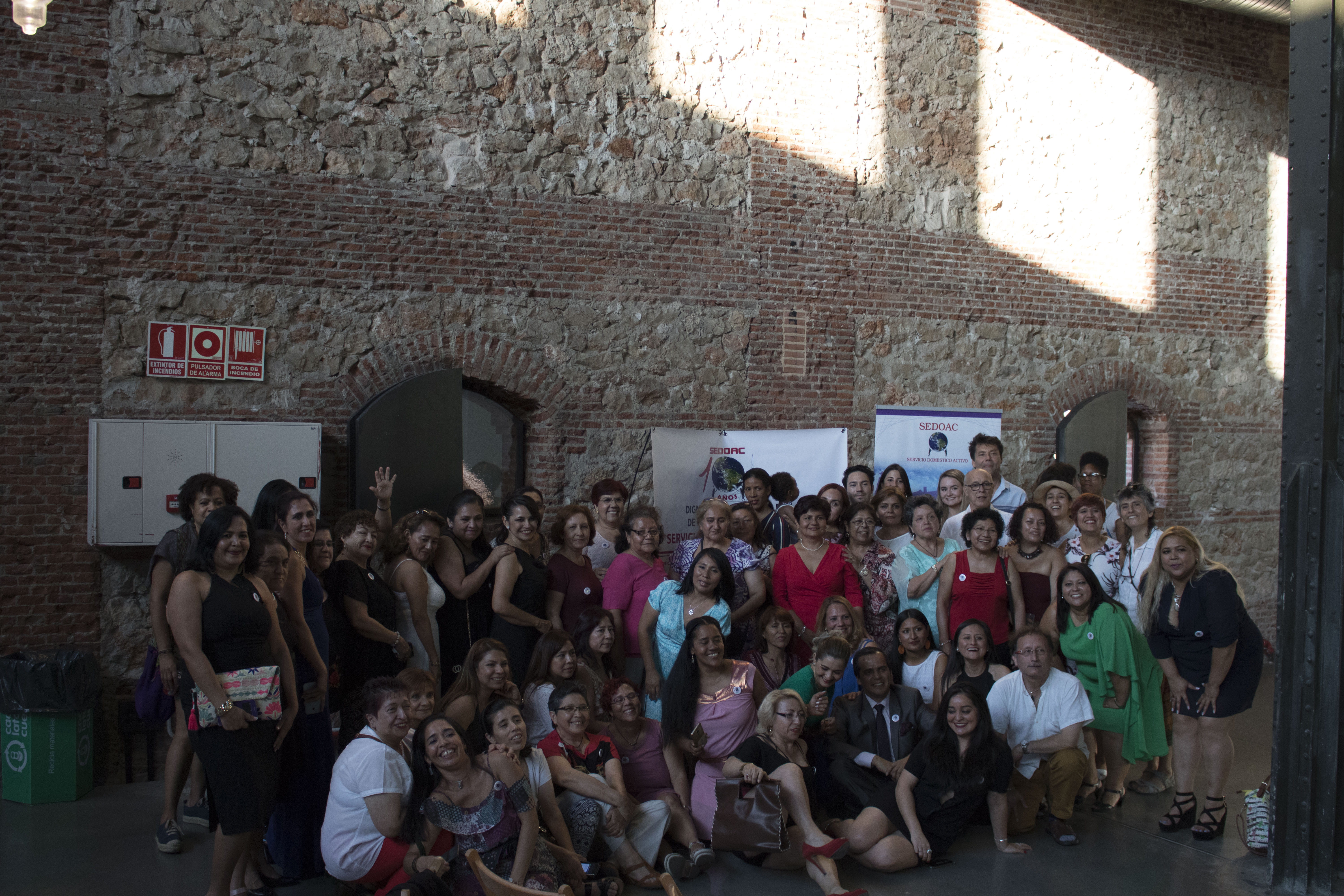Week 10
Final Reflections

On Migrant Women
Migrant women are perceived as the ideal laborer to perform tasks associated with social reproduction like domestic work since these are activities unappreciated by society, are scarcely qualified due to their existence in the informal economy, and are assumed to be inherent to the female condition. The conceptual tension arises from their social distinctions—class, gender, ethnicity—and create a narrative based on vulnerability and oppression, exacerbated by a condescending social perception. The concentration of immigrant women in reproductive services indicates a tripartite labor discrimination in the receiving society.
The codification of a migrant women is characterized either as “value-less”, given the nature of their work, or as “use-value”, given the immediacy of its consumption (Gutiérrez-Rodríguez, 2010, p. 145). Even the lack of political compromise by successive Spanish governments indicate a serious lack of recognition of the work being done by migrant women. In fact, it is the migratory policy that ends up shaping the segmented labor market in Spain. Migrant women are confined in certain activity sectors, characterized by the worst working conditions, “contributing to the flexibility and ethno-stratification of the labor market” (Parella Rubio, 2000, p. 285).
Given current social and political trends in Latin America, the demographic transition and the increasing incorporation of women in the paid labor force are likely to continue in Spain, unless another economic crisis would catalyze emigration like out of the Iberian country like it did in 2008. Latin American women continue to be more proactive about their role as breadwinners given their circumstances, since they send money to their relatives who remain in their countries of origin in higher proportions of their earnings and more regularly than men, even though in most cases their income is inferior to that of their male counterparts.
The plights of Latin American domestic workers living in Spain is the plight of migrant women who see themselves fighting the power structures that overarch them. The struggle is not only against a deficient labor law that enables exploitation and discrimination, but a societal belief that this work needs to be gendered, resulting in an ethno-stratification of this sector of the economy.
On SEDOAC
The objectives of organizations like SEDOAC is not only to raise awareness of the labor malpractices that have acquired an intergenerational nature and remain unaddressed by the upper echelons of the State, but to associate migrant women living under similar conditions. As a result, SEDOAC has created a domestic workers’ movement that has gained momentum in Spain’s public sphere. SEDOAC is an embodiment of the indomitable power of organizing at a grassroots level and the importance of reconfiguring the narrative as one of strength and commitment, not oppression and vulnerability.

On Transnational Cooperation
The fact of the matter is that the Latin American diaspora continues to be a source of demographic reconfiguration for the Spanish society. Over the last twenty years, Latin Americas have found themselves either presented with the opportunity to emigrate and search for a new life abroad, or given no other option but to leave their country and find a source of livelihood due to forces out of their control. Intersecting gender and class, the labor force of a developed country that receives a high influx of migrants over a sustained period of time becomes a case study in whether inclusion and equal rights have been operationalized and put effectively at work, or whether equality remains a rhetorical device that seldom transforms the lives of immigrants for the better.
The necessity to engage in transnational networking is not a matter of when and why, but how. Creating solidarity linkages with domestic workers around the world involve several challenges. First, the cultural differences between these constituencies can result in linguistic obstacles in the effort to create a network. How can a Bangladeshi woman working in Dubai share their strategies to deal with structural injustices with a Colombian in Madrid, a Haitian in New York, or a Filipino in Shanghai?
Second, there is a huge time investment needed to consolidate these networks. The first transnational links between domestic workers’ associations, organized under a same banner, occurred only after the International Federation of Domestic Workers (IFDW) was formed in 2013. This came four years after Convention 189 was signed by the ILO in 2009. Interestingly, the IFDW arose from the conglomeration of 12 domestic workers’ associations, thus symbolizing the power that grassroots organizing have in creating change in the struggle for political representation.
On Intersectional Discursive Techniques
As I mentioned in my Week 1 post, one of my main objectives was not only understand the contexts Latin American migrant women come from and currently live under, but also use them to formulate a clear way of articulating them for the purposes of advancing equity. As mentioned by Dr. Rebecca Amato of the Urban Democracy Lab at Gallatin, “too often, contemporary Leftist scholars are unable to translate the language of scholarship into the language of social action […] They get stuck on talking about solidarity without doing the hard work of building it.” These thought keep reverberating around my head once I begun contributing with SEDOAC.
After spending time with SEDOAC members, I begun to acquire certain talking points regarding the plights of migrant women working in the service industry. I begun to notice the overarching narrative. Domestic work and caregiving is a profession primarily carried out by migrants, granting the rest of the population with the freedom to partake in the formal economy and go about their own enterprises. SEDOAC members promptly declared that even though their employers bestowed domestic workers with the trust of taking care of their loved ones and their homes, domestic work itself is invisibilized and devalued by society at large.
Clearly articulated in the public sphere and in private conversations, SEDOAC affiliates have the capacity to critically think about their role in society, and the injustices they face on a daily basis. They use the power of anecdote to reflect on how they embody a global struggle for equity. Moreover, they are able to position themselves within the dynamics of globalization, through a lens that intersects gender and ethnicity, market forces and inherent stereotyping on behalf of their Spanish counterparts. Their claims are, until today, boiled down to three points:
- Access to a decent salary–a living wage–and the ability to register to the Spanish Social Security to obtain the pensions they deserve at the end of their working life;
- The enforcement of 8-hour workdays, the right to vacations and to holiday breaks;
- A reconfiguration of a Foreigners’ Law (“Ley de Extranjería”) that does not condemn domestic workers to precariousness, to exploitation and to have to live with fear.
Bibliography
Gutiérrez-Rodríguez, E. (2010). Migration, Domestic Work and Affect: A Decolonial Approach on Value and the Feminization of Labor. New York: Routledge Research in Gender and Society.
Parella Rubio, S. (2000). El trasvase de desigualdades de clase y etnia entre mujeres: los servicios de proximidad. Papers: Revista de Sociología (60), 275–289.

One of the things I’ve really enjoyed about your posts is the photographic evidence of how involved you’ve been in the SEDOAC collective’s activities. No matter if it’s a training session, a rally, or a celebration, you have documented the processes, reflected on them, and, most importantly, participated in them. All of this has shored up your points about the invisibility of domestic work and workers, the ways in which this informal economy keeps the formal economy running smoothly, and the feminization/racialization of domestic labor. I hope SEDOAC is able to both operationalize their specific objectives, as you’ve outlined, and build that common cause with international labor organizations. I’m anxious about the three-fold refugee crises (economic, political, climate) that are reshaping urban justice projects. Let’s hope SEDOAC can get these laws on the books before places like Spain (that are still safe havens) start closing doors and tightening rights protections.